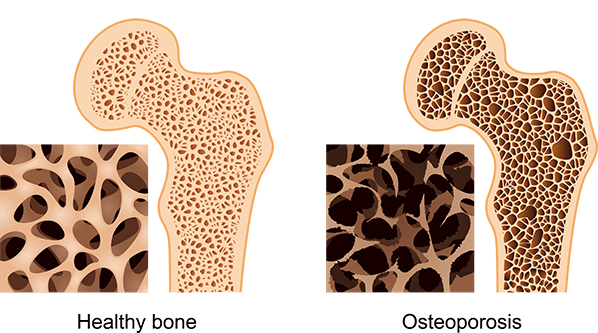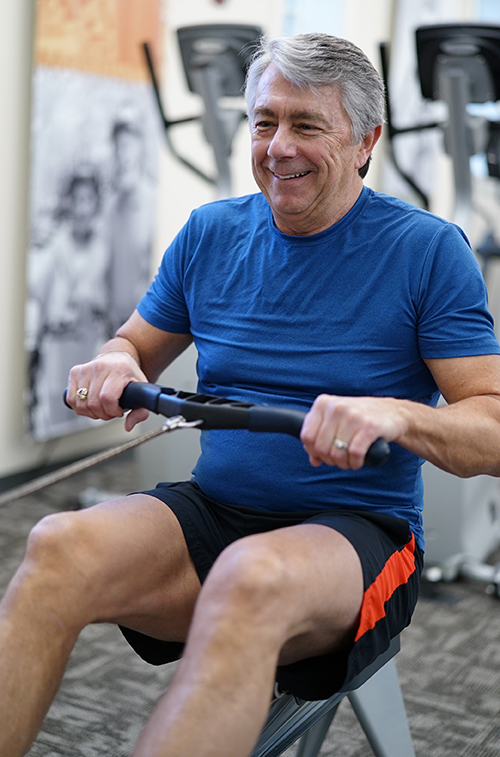Can You Prevent Osteoporosis? It is true osteoporosis is linked to hereditary factors that you can not change, such as sex, age, and genes. There are ways, however, to improve and even prevent weakened bones. This includes adopting a healthy lifestyle and diet. Eating foods rich in calcium and vitamin D are important, as is regular exercise. In particular, weight-bearing exercises such as weight training, walking, hiking, jogging, climbing stairs, tennis, and dancing can stimulate bone cells to produce proteins that bolster bone strength.
What Is Osteoporosis?
The inside of a healthy bone looks something similar to a honeycomb, with the body constantly absorbing and replacing bone tissue throughout your life. Starting around 30-35 years old bone density begins decreasing and over time new bone creation can not keep up with old bone removal. When osteoporosis occurs, the spaces in the honeycomb grow larger. As bones become less dense, they weaken and are more likely to break from a fall, often in the hip, spine, or wrist. According to the National Institute on Aging, osteoporosis is considered a “silent disease” because you may not notice any changes until a bone breaks. All the while, your bones were losing density for many years.

Risk Factors
The risk of osteoporosis grows as both men and women get older, however, women are more likely to develop osteoporosis due to naturally smaller, thinner bones. Also, estrogen, a hormone that assists with bones regrowth, decreases sharply when women reach menopause. This drastically increases the chance of postmenopausal women developing osteoporosis. During menopause, women may lose bone mass quickly for several years. After that, the loss slows down but continues. In men, the loss of bone mass is slower. But, by age 65 or 70, men and women are losing bone at the same rate.
The group at the highest risk for osteoporosis are White and Asian postmenopausal women who have a small, thin body frame and a family history of osteoporosis. The good news is, while you can not control hereditary risk factors there are many risk factors that you can control. These include:
- poor calcium and vitamin D intake
- smoking cigarettes (smokers absorb less calcium)
- excess amounts of alcohol interfere with vitamin D and calcium absorption
- lack of physical activity
- certain medications can cause bone loss such as, antacids, antiseizure medicine, chemotherapeutic drugs, to name a few. Consult with your doctor to find out if your medications are known to cause bone loss.

Preventing Osteoporosis
For many people, osteoporosis can be prevented at any age. It starts with a healthy lifestyle and diet to build strong dense bones. Keep your bones healthy as you age with a diet rich in Calcium and Vitamin D. Since the body does not produce its own calcium it is important to eat calcium-rich foods such as collard greens, nuts, salmon, yogurt, tofu, and oatmeal. Calcium aids in bone regrowth and Vitamin D aids with calcium absorption. We can get Vitamin D from both sunlight and food, however, very few foods (fatty fish, orange juice and fortified cereal) contain Vitamin D so take a supplement to get the recommended amount. Reduce your intake of caffeine, soft drinks, alcohol and cigarette smoke which all inhibit calcium absorption.
In addition to a healthy diet, there are two types of exercises to prevent osteoporosis and maintain bone density: weight-bearing and muscle-strengthening. Weight-bearing activities make you move against gravity while staying upright. Examples include walking, climbing stairs, jumping rope, jogging, or aerobics. Muscle-strengthening activities include lifting weights, using elastic bands, or weight machines.
Finally, consult with your doctor about a Bone Mineral Density test, or BMD, to find out how strong your bones are. A BMD test compares your bone density to the bone of an average healthy adult bone and determines if you are at risk for having a fracture. Bone density tests are used to help guide decisions about treatment and osteoporosis medication.
Got Medicare Questions?
We hope that this information on preventing osteoporosis is useful to you.
Let us help you answer your questions so that you can get back to the activities that you enjoy the most.
Call (888) 446-9157, click here to get an INSTANT QUOTE, or leave a comment below!
See our other websites:

